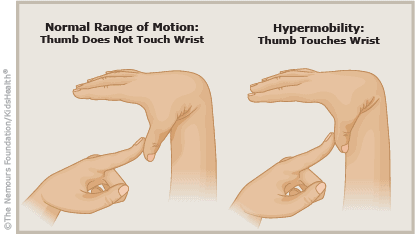We all have medical questions that we want answered – that’s why Dr. Amna Asif is here to provide us with her expert opinion! Every other week, she will be sharing her expert advice with us regarding a range of topics our followers are interested in learning more about. This week in Doc Talk, she talks about hypermobility spectrum disorders. Read ahead to find out what exactly it is, what the causes and symptoms are, and what you can do to prevent and treat it:

What Is Joint Hypermobility?
Hypermobility is the term used to describe the ability to move joints beyond the normal range of movement. Joint Hypermobility is common in the general population. It may be present in just a few joints or it could be widespread. It is most common during childhood and adolescence, in females, and amongst the Asian/African population. We are most flexible as babies and become less flexible with age. Joint flexibility varies from person to person as it depends on many factors such as age, racial background and genetics.
In most people, joint hypermobility does not give rise to symptoms. Sometimes it is considered an advantage, such as in athletes, gymnasts and dancers, who might specifically be selected because of their extra range of movement.
What are Hypermobility Syndromes?
Hypermobility Spectrum Disorders/Joint Hypermobility Syndromes are a group of clinical disorders in which Hypermobility affects many joints, and is associated with pain, fatigue, ligaments and joint injuries.
What Causes Hypermobility?
Hypermobility can be a feature of certain genetic / inherited diseases including Ehlers Danlos syndrome, Marfan’s syndrome and others. These are caused by inherited changes in the collagen proteins (connective tissue), which form the framework that supports the ligaments, tendons and soft tissues of the body. These disorders can cause damage to vital organs e.g larger blood vessels &heart. When a specific genetic diagnosis cannot be made, the condition is called Benign Joint Hypermobility Syndrome.

Symptoms
People with hypermobility syndromes are more prone to joint sprains and strains, and may have more pain than other people. While some people with this condition can have no problems, others can have a number of associated conditions such as:
- Non-specific back pain, chest pain or abdominal pains
- Flat feet
- Fatigue
- Headaches
- Heart palpitations or blood pressure dysregulations
- Dizziness
- Poor ability to concentrate
Diagnosis
Your Rheumatologist will take your medical history, examine you and may organise some blood tests and scans to diagnose this condition.
How Is It Treated?
Regular exercise and muscle conditioning is important for people with hypermobility syndrome as loose joints need strong muscles to support them. Specific exercise programs, such as those recommended by experienced physiotherapists, can also be very helpful. Occupational therapists (OT) can advise one about writing position and technique, as well as day-to-day activities. Supportive footwear and orthotics may also be helpful for some individuals.
What Are The Precautions?
Doing the specific exercises given by your physiotherapist is important and these need to be done regularly.
Other helpful measures include:
- Cold or heat packs
- Simple pain relief (paracetamol)
- Short term use of anti-inflammatory drugs (NSAIDs)
Activities that could result in sprains and strains, such as ballet and gymnastics, or which frequently cause pain should be avoided.
What Is The Prognosis?
As we normally lose joint flexibility through adulthood, symptoms of hypermobility may change or improve with time. For the vast majority, symptoms are manageable with simple measures such as physiotherapy. Sometimes it may be important to check other organs such as the heart, blood vessels and eyes when certain genetic diseases are thought to cause hypermobility – your doctor will advise if this is recommended for you.










What do you think?
You must be logged in to post a comment.